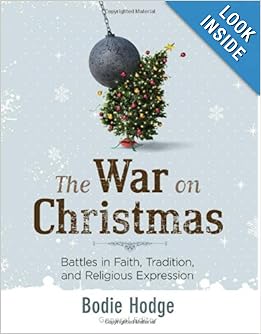
The War on Christmas:
Battles in Faith, Tradition, and Religious Expression Edited by Bodie Hodge
Each Christmas brings with it the fair share of holiday
greetings, treats, and jolly carols.
Yet, even in
the holiday spirit there is a war on Christmas going
on. In steps General Editor Bodie Hodge,
an author of the new book entitled The
War on Christmas. What do you really
know about Christmas, its origins, the birth of Jesus, and the promulgation of
a jolly old soul named Santa Claus? Bodie
tries to clear up the fog in our minds about the true meaning of Christmas, its
beginning, and the nagging questions many Christians face when talking to
others about reindeer, Santa Claus, and a supernatural birth. At the outset, I want to say that the
publishers, New Leaf Publishing Group did a fabulous job with the presentation
of the material in the book. The book’s
images, artwork, and feel really helped me get into the heart of the
material. The book is divided into 23
short chapters that deal with everything from the name of Christmas to
misconceptions surrounding Christmas.
Highlights
Bodie is quick to point out that the name ‘Christmas’ comes
from two words, Christ and mas, that means “Christ celebration.” (10) We find out also from Early Church father
Julius Africanus that Christians were celebrating Christ’s birth as early as
A.D. 221 (12). The date of Christ’s
birth might not be nailed down to the exact year but we do have a ballpark
figure around the date of his coming into the world. Further, Bodie mentions that some would
object to the celebration of Christmas based upon decorated trees in Jeremiah
10:1-6. He writes in opposition, “If
someone honors God with a decorated tree (as opposed to false gods) then how
can it be sinful?” (13).
I especially resonated with Bodie’s understanding of the foundation
of Christmas being found not in Luke 2 but back in Genesis 3:15. The story of sin, Adam and Eve, the creation,
and God’s covenantal promises puts legs on the story of Jesus being born into
this world. It’s hard to understand the “good
news” of Jesus without the bad news of Adam’s sin (42). There is a strong pointer in this chapter that
states that ‘God is a God of grace’ (44).
This message sings the message of the gospel clearly and mightily. My
only criticism of Bodie’s retelling of the biblical story of redemption here is
that there is little accounting here about how Christ’s coming, his death and
resurrection make sense of the renewal and restoration of creation.
Lastly, I appreciated the way Tim Chaffey brought out the
discussions on Christmas traditions. In
the chapter on angels, he writes, “The idea of angels singing on the night of
Christ’s birth has become so common that many are surprised to learn that the
Bible does not unequivocally state this.
This example provides a good opportunity to discuss traditions…..traditions
must be based on and consistent with Scripture” (62). It is a very good reminder that some
traditions we have in our seasonal happiness might/might not be in keeping with
God’s written revelation. Testing these
things in light of the clear testimony of Scripture is part of the Christian
life. Tim wants to lead people to love
God rather than just serve traditions. We
need to be careful here thought, that we not muddy the waters on issues which
might seem larger than they actually are.
Critcism
I enjoyed reading this book but I found issue with two major
things. One, Bodie and the editors spend
an inordinate amount of time in the book trying to find such things as the
exact date of Christ’s birth and information on the Christmas star. I’m not opposed to talking about these things
but I’m not sure why they make such a big difference in understanding the
incarnation. I’m still not convinced
that some of the issues the authors take up are of utmost importance, but I
appreciated the detailed analysis.
Secondly, the chapter on Worship: Santa Claus or Jesus is
problematic in many ways. One, the
author Roger Patterson assumes that the promotion of Santa (as some kind of
worship) leads to a de-emphasis on Christ (127). I would say that it is the parent’s
responsibility to teach children the true meaning of Christmas from a biblical
witness recognizing the incarnation as a unique event in history. Talking too much about Santa Claus could lead
to a moralism, but talking about Santa Claus a little bit could lead to healthy
discussions about what it means to give gifts (or time, money, etc.) to others
as a way of serving others. I think this
chapter oversteps its bounds by claiming that talking about Santa leads to
deceit and it is founded upon behavior modification. I’m not into shouting Santa from the rooftops
but I think we need to be careful about helping parents rightly understand the
Christmas story and use their own consciences as well.
Conclusion
I appreciated this book and am glad to have reviewed
it. I think many will find some
interesting connection points with their families around the story of Jesus
coming to Earth.
Thanks to Master Books and Handlebar Publishing Group for
the copy of this book in exchange for review.
Comments
Post a Comment